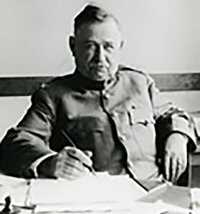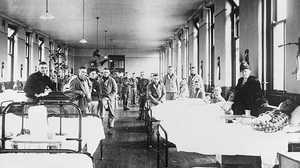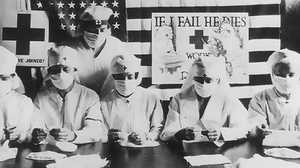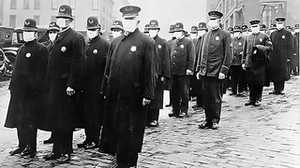Biography: Victor Vaughan

Victor Vaughan was no stranger to death and disease. Serving as a doctor during the Spanish-American War, Vaughan had witnessed the devastating effect of typhoid on young soldiers. Still, all that he had seen before paled in comparison to the swift and horrible death brought on by the influenza of 1918. In September, Vaughan, a former president of the American Medical Association, received urgent orders to proceed directly to Camp Devens outside of Boston. What Vaughan witnessed at the military changed his life forever and compelled him to question his very faith in medical science.
“The saddest part of my life,” Vaughan admitted, “was when I witnessed the hundreds of deaths of the soldiers in the Army camps and did not know what to do. At that moment I decided never again to prate about the great achievements of medical science and to humbly admit our dense ignorance in this case.” Surveying the scene at Camp Devens, Vaughan observed, “I saw hundreds of young stalwart men in uniform coming into the wards of the hospital. Every bed was full, yet others crowded in. The faces wore a bluish cast; a cough brought up the blood-stained sputum.”
On the day Vaughan arrived at Camp Devens, 63 men succumbed to influenza.
Vaughan applied all he had to trying to understand and conquer the silent killer that was taking the lives of the men around him. His investigation produced a startling conclusion. Vaughan uncovered the unnerving fact that while most influenza viruses prey on the old or the very young, this strain took aim at those in the prime of life.
“This infection,” Vaughan wrote, “like war, kills the young, vigorous, robust adults…The husky male either made a speedy and rather abrupt recovery or was likely to die.”
In the late autumn of 1918, as the flu cut a deadly path through entire towns and villages, Vaughan’s observation of mortality rates from around the nation yielded a horrifying equation.
“If the epidemic continues its mathematical rate of acceleration, civilization could easily disappear from the face of the earth.”
Then, to Vaughan’s relief, influenza seemed to slip away as mysteriously as it had arrived. In its aftermath, Vaughan knew that Americans and all citizens of the world were lucky the “Spanish Lady” hadn’t claimed even more victims. Vaughan pointed out that doctors of the day “knew no more about the flu than 14th century Florentines had known about the Black Death.”







